形容词放在不定代词后面
- 格式:ppt
- 大小:1.88 MB
- 文档页数:17

形容词副词定义:中文的意思是“……的”的词是形容词,用来修饰名词;中文意思是“……地”的词是副词,用来修饰动词、形容词或副词形容词与副词在句中的位置形容词形容词的比较级在句中的位置名词所有格副词的比较级形容词副词的转换考点清单练习:练习①It is a ____(sun) day.②It is a _____(rain) day.③I think you are a _____(luck) girl.④The teacher said he had _____to tell us.A. anything importantB. important anythingC. something importantD. important something⑤Look !Jack is ____(excite,excited) .⑥I feel ____(happy) every day.⑦The baby is sleeping ,please keep______(quiet,quietly)考点二:形容词的比较级(1)在形容词词尾加上“er”“est”构成比较级、最高级:bright(明亮的)—brighter—brightest broad(广阔的)—broader—broadest cheap(便宜的)—cheaper—cheapest clean(干净的)—cleaner—cleanest clever(聪明的)—cleverer—cleverest cold(寒冷的)—colder—coldestcool(凉的)—cooler—coolest dark(黑暗的)—darker—darkest dear(贵的)—dearer—dearest deep(深的)—deeper—deepestfast(迅速的)—faster—fastest few(少的)—fewer—fewestgreat(伟大的)—greater—greatest hard(困难的,硬的)—harder—hardest high(高的)—higher—highest kind(善良的)—kinder—kindestlight(轻的)—lighter—lightest long(长的)—longer—longestloud(响亮的)—louder—loudest low(低的)—lower—lowestnear(近的)—nearer—nearest new(新的)—newer—newestpoor(穷的)—poorer—poorest quick(快的)—quicker—quickest quiet(安静的)—quieter—quietest rich(富裕的)—richer—richestshort(短的)—shorter—shortest slow(慢的)—slower—slowestsmall(小的)—smaller—smallest smart(聪明的)—smarter—smartest soft(柔软的)—softer—softest strong(强壮的)—stronger—strongest sweet(甜的)—sweeter—sweetest tall(高的)-taller-tallestthick(厚的)—thicker—thickest warm(温暖的)—warmer—warmest weak(弱的)—weaker—weakest young(年轻的)—younger—youngest (2).双写最后一个字母,再加上“er”“est”构成比较级、最高级:big(大的)—bigger—biggest fat(胖的)—fatter—fattesthot(热的)—hotter—hottest red(红的)—redder—reddestsad(伤心的)—sadder—saddest thin(瘦的)—thinner—thinnestwet(湿的)—wetter—wettest mad(疯的)—madder—maddest(3).以不发音的字母e结尾的形容词,加上“r”“st”构成比较级、最高级:able(能干的)—abler—ablest brave(勇敢的)—braver—bravest close(接近的)—closer—closest fine(好的,完美的)—finer—finest large(巨大的)—larger—largest late(迟的)—later—latestnice(好的)—nicer—nicest ripe(成熟的)—riper—ripestrude(粗鲁的)—ruder—rudest safe(安全的)—safer—safeststrange(奇怪的)—stranger—strangest wide(宽广的)—wider—widestwise(睿智的,聪明的)—wiser—wisest white(白的)—whiter—whitest(4).以字母y结尾的形容词,把y改为i,再加上“er”“est”构成比较级、最高级:busy(忙碌的)—busier—busiest dirty(脏的)—dirtier—dirtiestdry(干燥的)—drier—driest early(早的)—earlier—earliesteasy(容易的)—easier—easiest friendly(友好的)—friendlier—friendliest funny(好玩的)—funnier—funniest happy(开心的)—happier—happiest healthy(健康的)—healthier—healthiest heavy(重的)—heavier—heaviesthungry(饿的)—hungrier—hungriest lazy(懒惰的)—lazier—laziestlucky(幸运的)—luckier—luckiest naughty(调皮的)—naughtier—naughtiest noisy(嘈杂的)—noisier—noisiest pretty(美丽的)—prettier—prettiestsilly(傻的)—sillier—silliest spicy(辣的)—spicier—spiciestthirsty(渴的)—thirstier—thirstiest ugly(丑的)—uglier—ugliest(5).双音节、多音节形容词,在单词前面加上“more”“most”构成比较级、最高级:afraid(害怕的)—more afraid—most afraidbeautiful(美丽的)—more beautiful—most beautifulcareful(仔细的)—more careful—most carefulcheerful(开心的)—more cheerful—most cheerfulcrowded(拥挤的)—more crowded—most crowdeddangerous(危险的)—more dangerous—most dangerousdelicious(美味的)—more delicious—most deliciousdifficult(困难的)—more difficult—most difficultexciting(令人兴奋的)—more exciting—most excitingexpensive(昂贵的)—more expensive—most expensivefamous(著名的)—more famous—most famousfrightened(受惊的)—more frightened—most frightenedfrightening(令人害怕的)—more frightening—most frighteninghard-working(勤奋的)—more hard-working—most hard-workinghelpful(有帮助的)—more helpful—most helpfulhonest(诚实的)—more honest—most honestimportant(重要的)—more important—most importantinteresting(有趣的)—more interesting—most interestingpolite(有礼貌的)—more polite—most politeterrible(可怕的)—more terrible—most terribletired(累的)—more tired—most tired(6).不规则变化的形容词:bad(坏的)—worse—worst far(远的)—farther—farthest (far—further—furthest) good(好的)—better—best ill(病的)—worse—worstlittle(少的)—less—least many(多的)—more—most much(多的)—more—most old(年老的)—older—oldest ( old—elder—eldest) well(好的,身体好的)—better—best练习1. Is your friend ____ (young) than you ?2. Shanghai is one of ______ (big) cities in the world.3. Do you think English is _____important than maths。
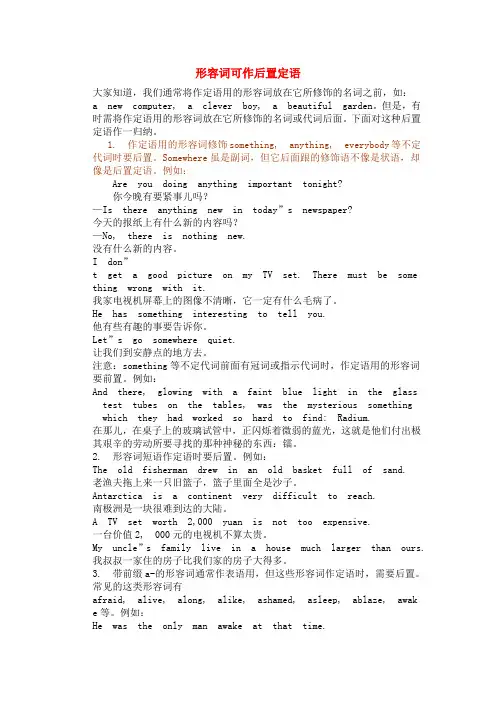
形容词可作后置定语大家知道,我们通常将作定语用的形容词放在它所修饰的名词之前,如:a new computer, a clever boy, a beautiful garden。
但是,有时需将作定语用的形容词放在它所修饰的名词或代词后面。
下面对这种后置定语作一归纳。
1. 作定语用的形容词修饰something, anything, everybody等不定代词时要后置。
Somewhere虽是副词,但它后面跟的修饰语不像是状语,却像是后置定语。
例如:Are you doing anything important tonight?你今晚有要紧事儿吗?—Is there anything new in today”s newspaper?今天的报纸上有什么新的内容吗?—No, there is nothing new.没有什么新的内容。
I don”t get a good picture on my TV set. There must be something wrong with it.我家电视机屏幕上的图像不清晰,它一定有什么毛病了。
He has something interesting to tell you.他有些有趣的事要告诉你。
Let”s go somewhere quiet.让我们到安静点的地方去。
注意:something等不定代词前面有冠词或指示代词时,作定语用的形容词要前置。
例如:And there, glowing with a faint blue light in the glass test tube s on the tables, was the mysterious something which they had work ed so hard to find: Radium.在那儿,在桌子上的玻璃试管中,正闪烁着微弱的蓝光,这就是他们付出极其艰辛的劳动所要寻找的那种神秘的东西:镭。


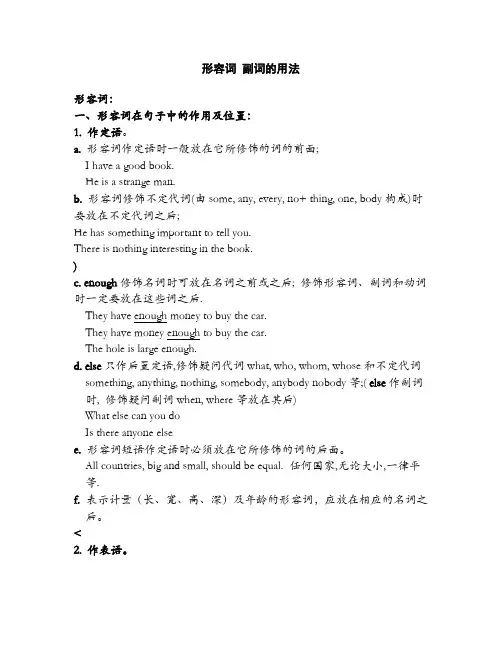
形容词 副词的用法形容词: 一、形容词在句子中的作用及位置: 1. 作定语。
a. 形容词作定语时一般放在它所修饰的词的前面;I have a good book. He is a strange man. b. 形容词修饰不定代词(由 some, any, every, no+ thing, one, body 构成)时 要放在不定代词之后; He has something important to tell you. There is nothing interesting in the book. ) c. enough 修饰名词时可放在名词之前或之后; 修饰形容词、副词和动词 时一定要放在这些词之后. They have enough money to buy the car. They have money enough to buy the car. The hole is large enough. d. else 只作后置定语,修饰疑问代词 what, who, whom, whose 和不定代词 something, anything, nothing, somebody, anybody nobody 等;( else 作副词 时, 修饰疑问副词 when, where 等放在其后) What else can you do Is there anyone else e. 形容词短语作定语时必须放在它所修饰的词的后面。
All countries, big and small, should be equal. 任何国家,无论大小,一律平 等. f. 表示计量(长、宽、高、深)及年龄的形容词,应放在相应的名词之 后。
< 2. 作表语。
在系动词和半系动词 feel(感到),look(看起来),sound(听起来), smell(闻起来),taste(尝起来),become(变成)get(变成),turn (变成),fall(变成), seem(似乎,好象)后,用形容词作表语。
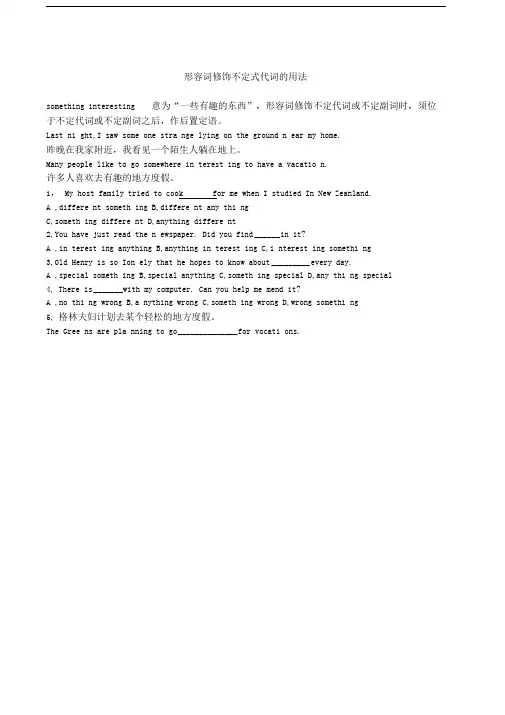
形容词修饰不定式代词的用法something interesting 意为“一些有趣的东西”,形容词修饰不定代词或不定副词时,须位于不定代词或不定副词之后,作后置定语。
Last ni ght,I saw some one stra nge lying on the ground n ear my home.昨晚在我家附近,我看见一个陌生人躺在地上。
Many people like to go somewhere in terest ing to have a vacatio n.许多人喜欢去有趣的地方度假。
1,My host family tried to cook for me when I studied In New Zeanland.A ,differe nt someth ing B,differe nt any thi ngC,someth ing differe nt D,anything differe nt2,You have just read the n ewspaper. Did you find ______ i n it?A ,in terest ing anything B,anything in terest ing C,i nterest ing somethi ng3,0ld Henry is so Ion ely that he hopes to know about _________ every day.A ,special someth ing B,special anything C,someth ing special D,any thi ng special4,There is _______ w ith my computer. Can you help me mend it?A ,no thi ng wrong B,a nything wrong C,someth ing wrong D,wrong somethi ng5,格林夫妇计划去某个轻松的地方度假。
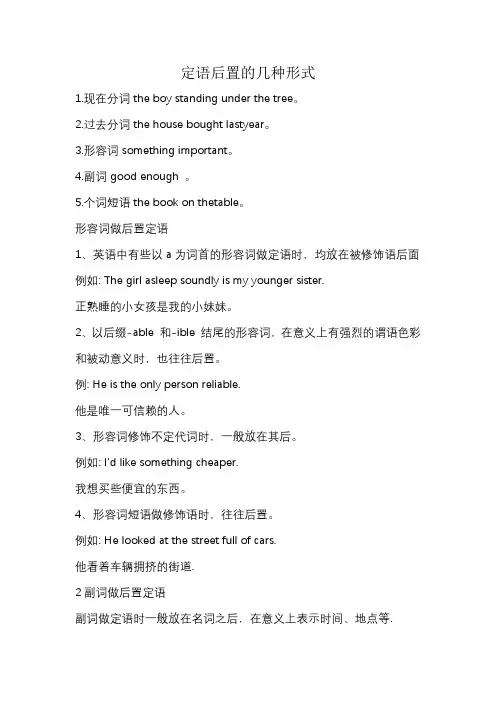
定语后置的几种形式
1.现在分词the boy standing under the tree。
2.过去分词the house bought lastyear。
3.形容词something important。
4.副词good enough 。
5.个词短语the book on thetable。
形容词做后置定语
1、英语中有些以a为词首的形容词做定语时,均放在被修饰语后面例如: The girl asleep soundly is my younger sister.
正熟睡的小女孩是我的小妹妹。
2、以后缀-able 和-ible 结尾的形容词,在意义上有强烈的谓语色彩和被动意义时,也往往后置。
例: He is the only person reliable.
他是唯一可信赖的人。
3、形容词修饰不定代词时,一般放在其后。
例如: I’d like something cheaper.
我想买些便宜的东西。
4、形容词短语做修饰语时,往往后置。
例如: He looked at the street full of cars.
他看着车辆拥挤的街道.
2副词做后置定语
副词做定语时一般放在名词之后,在意义上表示时间、地点等.
例如: The weather here is very nice. 这里的天气很好。
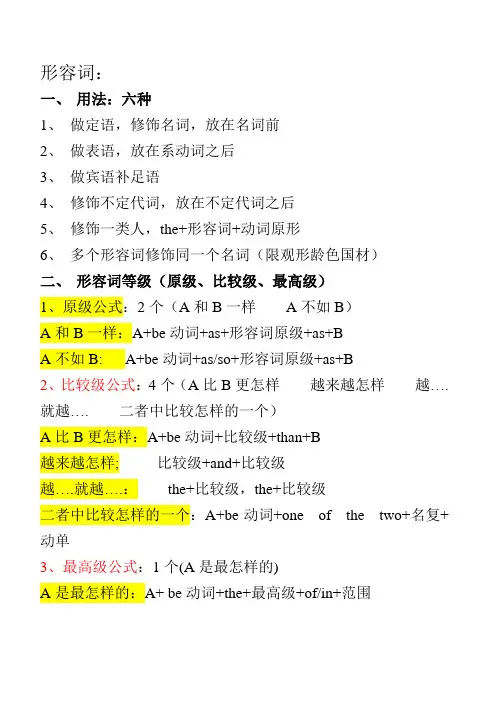
形容词:一、用法:六种1、做定语,修饰名词,放在名词前2、做表语,放在系动词之后3、做宾语补足语4、修饰不定代词,放在不定代词之后5、修饰一类人,the+形容词+动词原形6、多个形容词修饰同一个名词(限观形龄色国材)二、形容词等级(原级、比较级、最高级)1、原级公式:2个(A和B一样A不如B)A和B一样:A+be动词+as+形容词原级+as+BA不如B: A+be动词+as/so+形容词原级+as+B2、比较级公式:4个(A比B更怎样越来越怎样越….就越…. 二者中比较怎样的一个)A比B更怎样:A+be动词+比较级+than+B越来越怎样; 比较级+and+比较级越….就越….:the+比较级,the+比较级二者中比较怎样的一个:A+be动词+one of the two+名复+动单3、最高级公式:1个(A是最怎样的)A是最怎样的:A+ be动词+the+最高级+of/in+范围三、同义句转换:A+ be动词+the+最高级+of/in+范围= A+be动词+比较级+than+any other+名单+范围=A+be动词+比较级+than+the other+可复+范围= A+be动词+比较级+than+anybody/anything+else+范围四、形容词比较级和最高级的变换1、一般情况下,比较级+er 最高级+est2、以e结尾的比较级+r, 最高级+st3、辅音字母+y结尾的,变y为i后,比较级+er最高级+est4、辅音+元音+辅音结尾的,双写末尾的辅音字母后比较级+er最高级+est5、多音节和双音节词,比较级+more 最高级+most6、不规则good/well--better--best bad/badly—worse--worstmany/much—more—most little—less—leastold—older/elder—oldest/eldestfar—farther/further—farthest/furthest。


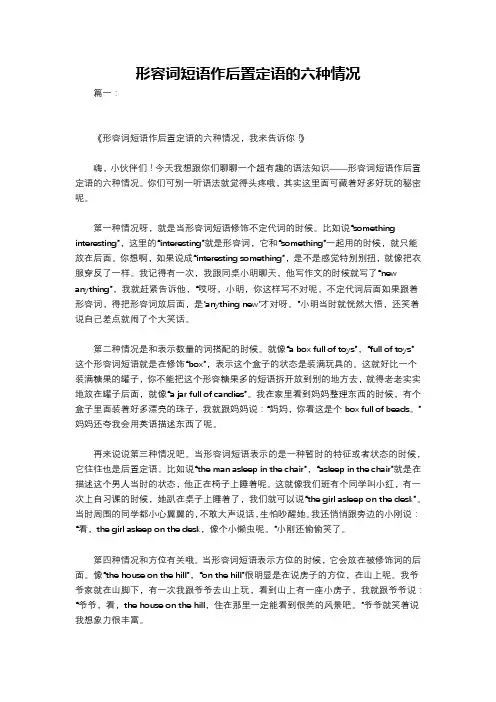
形容词短语作后置定语的六种情况篇一:《形容词短语作后置定语的六种情况,我来告诉你!》嗨,小伙伴们!今天我想跟你们聊聊一个超有趣的语法知识——形容词短语作后置定语的六种情况。
你们可别一听语法就觉得头疼哦,其实这里面可藏着好多好玩的秘密呢。
第一种情况呀,就是当形容词短语修饰不定代词的时候。
比如说“something interesting”,这里的“interesting”就是形容词,它和“something”一起用的时候,就只能放在后面。
你想啊,如果说成“interesting something”,是不是感觉特别别扭,就像把衣服穿反了一样。
我记得有一次,我跟同桌小明聊天,他写作文的时候就写了“new anything”,我就赶紧告诉他,“哎呀,小明,你这样写不对呢,不定代词后面如果跟着形容词,得把形容词放后面,是‘anything new’才对呀。
”小明当时就恍然大悟,还笑着说自己差点就闹了个大笑话。
第二种情况是和表示数量的词搭配的时候。
就像“a box full of toys”,“full of toys”这个形容词短语就是在修饰“box”,表示这个盒子的状态是装满玩具的。
这就好比一个装满糖果的罐子,你不能把这个形容糖果多的短语拆开放到别的地方去,就得老老实实地放在罐子后面,就像“a jar full of candies”。
我在家里看到妈妈整理东西的时候,有个盒子里面装着好多漂亮的珠子,我就跟妈妈说:“妈妈,你看这是个box full of beads。
”妈妈还夸我会用英语描述东西了呢。
再来说说第三种情况吧。
当形容词短语表示的是一种暂时的特征或者状态的时候,它往往也是后置定语。
比如说“the man asleep in the chair”,“asleep in the chair”就是在描述这个男人当时的状态,他正在椅子上睡着呢。
这就像我们班有个同学叫小红,有一次上自习课的时候,她趴在桌子上睡着了,我们就可以说“the girl asleep on the desk”。
专题02 短文改错高频考点TOP 2 形容词和副词考点一形容词误用作副词(与-ly结尾的副词相关),副词误用作形容词1.形容词误用作副词形容词的定义:形容词是用来修饰名词的词,一般放在所修饰的名词前面。
作用:1)形容词在居中作定语、表语、宾语补足语。
2)英语单词中something, anything, nothing等不定代词被形容词修饰时,形容词放在不定代词后面。
2.副词误用作形容词副词的定义:是一类用以修饰动词(相当于英语的verb)或加强描绘词组或整个句子的词,修饰名词的词一般为形容词,又称限制词。
副词的位置:1)在许多情况下,副词都放在所修饰的动词后面或句末;2)置于句中的副词,若碰上助动词,则通常放在助动词之后、主要动词之前;3)也可以置于句首修饰全句。
1)The first thing we can do is to make our campus more beautifully.【答案】beautifully改为beautiful【解析】make sth. +adj.2)You may attend to English classes to feel a differently learning style.【答案】differently改为different【解析】形容词修饰learning style3)The path to your dreams may not be smoothly and wide,even some sacrifices are needed,but hold on to theend.【答案】smoothly改为smooth【解析】be动词后是形容词4)Besides,it is a good idea learn and sing Chinese songs,because by doing so you'll learn and rememberChinese words more easy.【答案】easy改为easily【解析】easily修饰learn和remember5)Of course,it's strong prohibited to buy or sell anything made of antelopes fur.【答案】strong改为strongly【解析】strongly修饰prohibited6)Obvious,it's important for us to have enough sleep and a properly diet.【答案】properly改为proper【解析】形容词修饰副词考点二易混淆同型形容词和副词某些词本身既作形容词,也作副词。
在句子中,大多数形容词一般放在两个位置:一、放在名词之前;不定代词或不定副词之后。
1、放在名词前(1)This is an interesting book. 这是一本有趣的书。
(2)He bought a nice bike. 他买了一辆漂亮的自行车。
(3)The beautiful flower is Mary's. 漂亮的花是玛丽的。
2、放在不定代词或不定副词的后面不定代词是由some、any、every、no分别加上thing、body、one构成,如something、somebody、someone等等;不定副词是由some、any、every、no分别加上where构成。
(1)I want to eat something delicious. 我想吃一些美味。
(2)Someone else wants to see you ,too. 其他的人也想见你。
(3)I will go somewhere interesting as soon as the holiday begins. 假期一开始我就去一些有趣的地方。
二、放在系动词的后面初中常用的系动词有:be、look、sound、smell、taste、feel、become、get、grow、turn、go等等。
(1)She is very pretty. 她很漂亮。
(2)The music sounds beautiful. 这个音乐听起来很美。
(3)The tea smells very nice. 茶闻起来很香。
(4)I feel very happy. 我感觉很快乐。
(5)The weather gets colder and colder. 天气变得越来越冷。
(6)The food in the fridge went bad. 冰箱里的食物变坏了。
三、只能放在动词之后有些形容词只能动词的后面,不能放在名词前作定语。
英语词汇语法用法小结1、人称代词主格作主语,宾格作宾语,形容词性物主代词修饰名词作定语,名词性物主代词作表语。
2、if 引导的条件状语从句:主将从现。
3、either…or/ neither…nor…及there be 句型采用就近原则。
3、过去的时间用过去的动作,过去的动作用动词的过去式。
4、动词+副词的短语,代词作宾语时放在中间。
5、形容词修饰不定代词时,放在不定代词之后---定语后置。
6、enough修饰名词时前置,修饰形容词时,状语后置。
7、表示虚拟语气时,系动词用were.8、关联词用because 不用so, 用though/although 不用but.9、分数表示法:基子序母,多子多母。
10、及物动词用语被动语态,不及物动词不可用于被动语态。
11、动词作主语时,动词改成动名词。
12、介词后面的动词改成动名词。
13、不定代词作主语时,谓语动词用单数。
14、形容词修饰名词、代词作定语,副词修饰形容词、动词作状语。
15、时间状语、地点状语、方式状语放在句子末尾。
16、make/keep+宾语+补语(形容词)。
17、一听、两看、一感觉、一使、一让、一帮助后面用动词原形。
18、一日三餐和球类运动前不用任何冠词。
19、江河湖海和乐器前加the。
20、表示一天的某时用in,表示某天的某时用on,表示几点几分用at,表示月、季、年用in。
21、a little, much, even, far, still 可修饰比较级。
22、one of + 最高级+ 名词复数。
23、两者比较用比较级,三者或三者以上比较用最高级。
24、单音节词的比较级加er,最高级加est,部分双音节词和多音节的比较级前加more, 最高级前加most。
25、两者比较强调一者时,比较级前也加the。
26、附加疑问句:前肯后否,前否后肯。
27、表示客观存在、客观真理、自然现象时,用一般现在时。
28、感叹句中How修饰形容词、副词,What 修饰名词。
在英语中某些定语有时放在被修饰词之后,我们称之为“后置定语”。
后置定语我们可以分为三种情况:I.单词作后置定语1.当形容词修饰由some、any、every、no等构成的不定代词时通常放在不定代词之后.There is nothing important in Today’s newspaper. 今天的报纸上没有重要的新闻。
2.词义具有动词性质的现在分词或过去分词作定语时一般后置。
I have answered all the letters received。
所有收到的信我都已经回了。
We went through a door opening on to the garden. 我们穿过通往花园的大门.3.表示地点或时间的副词here、there、home、downstairs、upstairs、today、before等作定语时要后置。
The man downstairs came back this morning。
楼下的男子是今天上午回来的。
On the way home,we picked up a lot of rubbish。
在回家的路上我们拣起了很多垃圾。
4.某些形容词如last、next;enough;nearby以及以—able、-ible结尾的形容词可用在名词之前,也可用在名词之后,其意义基本不变。
I don’t have money enough(enough money)to buy the car。
我没有足够的钱买轿车。
We went to the movie theatre last Sunday(on Sunday last). 我们上星期日去了电影院。
He hasn’t found any suitable actors(actors suitable). 他还有找到合适的演员。
5.某些只能用作表语的形容词如afraid、alive、alone、asleep等作定语时一般后置.He was the only man alive。